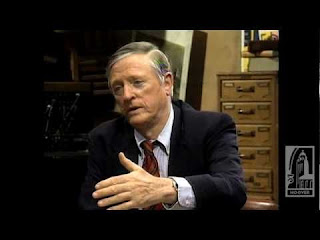 |
| Source:Hoover Institution- Conservative writer William F. Buckley, on Uncommon Knowledge with Peter Robinson, in 1998. |
From the Hoover Institution
This might sound warped or insane or something but I'm going to argue that two of the most divisive decades America has ever had are the 1960s and 1980s had more in common, then they were different.
The 1960s a decade that Liberals generally speak in positive terms. (and I'm one of them) And the 1980s a decade that Conservatives tend to speak in positive terms. I'm a Liberal but I generally look at the 1980s in positive terms, except for the music. I say this because both decades were about freedom but to a certain extent in different forms.
The 1960s was about freedom, thats what Hippies and the civil rights movement we're fighting for. And this was also one of the reasons why so many Americans were killed as a result in a big way because of what they were fighting for. Jack Kennedy, Malcolm X, Martin King, Bobby Kennedy and others, were killed because of they stood for, which was freedom.
The 1980s was also a decade about freedom, economic freedom but also social freedom, with the Reagan Revolution as well as the ending of the Cold War with Russia.
The Hippie Generation was an anti-establishment generation: people who were bored by the 1950s. And how culturally conservative the country was and didn't want to live that type of life themselves. And wanted to be themselves, not be part of the establishment. Even if the Establishment saw them as weird, freakish or even Un-American, all charges that were thrown at them.
In the mid and late 1970s, we had a tax revolt in America, especially in California. People who were tired of big government and high taxes, people who believed that for what they were being taxed. They weren't getting much in return. The strange thing is that even though there was this movement going on against big government, there was another movement going on that started about the same time that pushed for another form of big government, which is where Religious-Right came to prominence and power in America.
Democrats tend to love the 1960s and dislike the 1980s just as much politically. Whereas Republicans tend to hate the 1960s and love the 1980s. But what both sides tend not to be aware of, is that both decades both had one big thing in common, they were both about freedom, not just for some people but the entire country. They just went about trying to accomplish these things in different ways.
